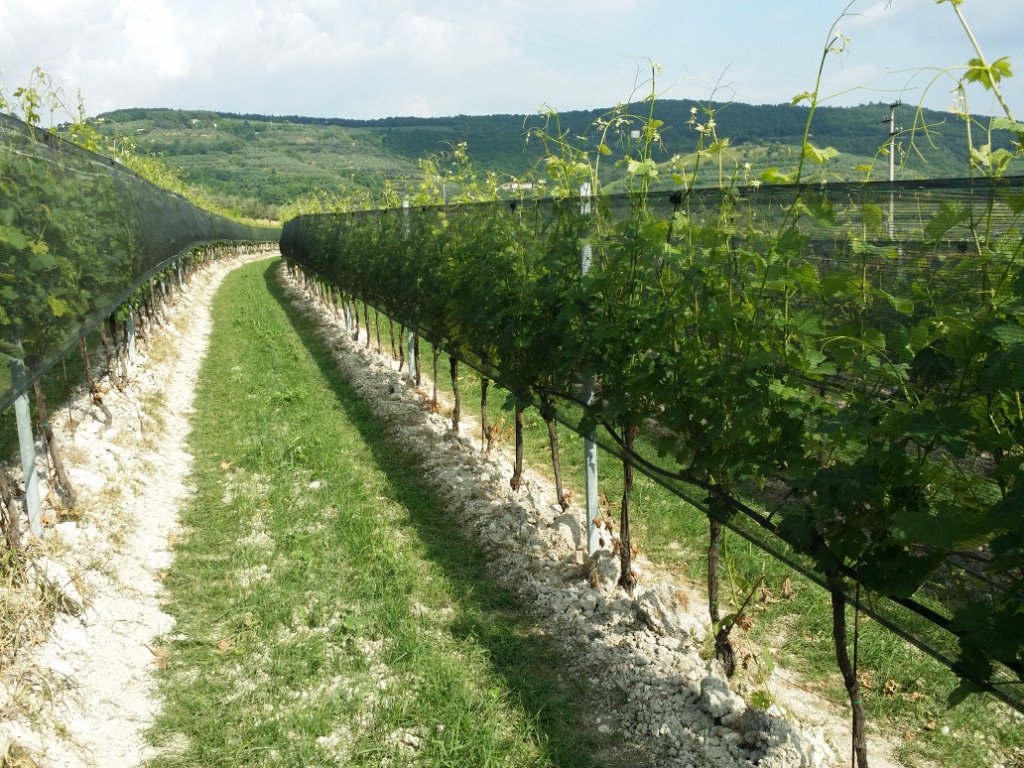While the “Terre dei Pallavicini” winery chooses the Iride® and Fructus® agrotextiles, the Group continues its research with the University of Palermo to evaluate the best anti-scorching solutions.
In recent years the entire wine industry has been severely affected by extreme weather events and high temperatures, often the cause of irreversible damage to crops. In response, the Arrigoni Group has stood out for its innovative approach to the problem and major investments in R&D, which have enabled it to finetune original new solutions, such as the Iride® and Fructus® ranges, already successfully adopted by a number of wineries, including Terre dei Pallavicini of Rome. As well as safeguarding vines from birds, insects, hail, frost, sun and wind, these protection systems also guarantee a better microclimate and growing conditions. All of this also actively contributes to determining the future quality of the wine.
A second form of risk is associated with global climate change
According to a study by the French National Institute of Agricultural Research (INRA) published in 2020 in American science magazine PNAS, if average temperatures rise by 2° Celsius by 2050, 56% of current wine-growing regions will be compromised. The study focused more specifically on the most widely grown grape varieties, including Cabernet Sauvignon, Merlot, Chardonnay, Pinot Nero, Riesling and Syrah, which account for 35% of wine-growing areas in the world and 64-87% in Australia, Chile, France, New Zealand, Switzerland and the US.
For Arrigoni the need for urgent action to combat the inevitable changes that global warming is having on vines and, as a result, on the wine we produce, is therefore becoming increasingly pressing. In fact, the company has identified two macro areas of risk. The first is connected with annual climate fluctuations, which can lead to harvests with strong variations in terms of quantity and quality. A second form of risk is associated with global climate change, which is causing growers to migrate towards non-traditional production areas.

It the perfect solution for various different applications
Fructus®, in particular, is the range of anti-hail coverings designed and developed by Arrigoni for grape producers and fruit growers in general which is capable of playing a crucial role in preventing damage from adverse weather events and containing other potential threats to these crops.
Iride®, meanwhile, is the line that guarantees excellent protection against both hail and birds, the intrinsic characteristics of its light elastic mesh net making it the perfect solution for various different applications.
We also made assessments using a thermal imager, measuring the temperature of covered
Giulio Senni, CEO of “Terre dei Pallavicini” in Colonna (Rome), one of the oldest and biggest wineries in Rome, has been able to witness the effectiveness of these solutions in first person. “Our company has been making wine since 1670 and today we have around 70 hectares of vines”, he explains. “We mainly grow white grapes, such as Malvasia Puntinata, and we are strong believers in reviving native varieties. In recent years we have seen some very high temperatures with devastating peaks for the vineyard.
This leads to delays in growth cycles and scorching. And that’s not all: some diseases are accelerated by the climate change crisis and the stress to which the plants are subjected. This being the case, I believe that the Arrigoni products, in particular Iride® and Fructus®, are two valid solutions for both shading the rows of the vineyard and protecting the plants and grapes from the burns and stress that high temperatures can cause.”

Returning to research into wine grapes, this year Arrigoni and the University of Palermo concluded a research project launched in 2019 which aimed to evaluate the best anti-scorching solutions. T
o this end, Rosario Di Lorenzo, professor at the Department of Agricultural, Food and Forestry Sciences at the University of Palermo, which is working on the research project, commented: “Temperatures impact on the metabolic capacity of the plant and therefore the dynamics of both growth processes and, in particular, ripening processes.
One of the main problems caused by climate change is what is known as the decoupling of the different parameters of quality – technological quality, phenolic quality, aromatic quality – because these metabolites follow different synthetic paths and are therefore impacted in different ways by high temperatures”. Commenting on the initial results, Daniele Micciché, PhD student on the Biodiversity in Agriculture and Forestry course at the University of Palermo, added: “In terms of the climate, we also made assessments using a thermal imager, measuring the temperature of covered and non-covered grapes. Also in this case we were able to verify that the cover produces a clear and statistically significant reduction in the temperature of the grapes, a development that should not be underestimated”.








